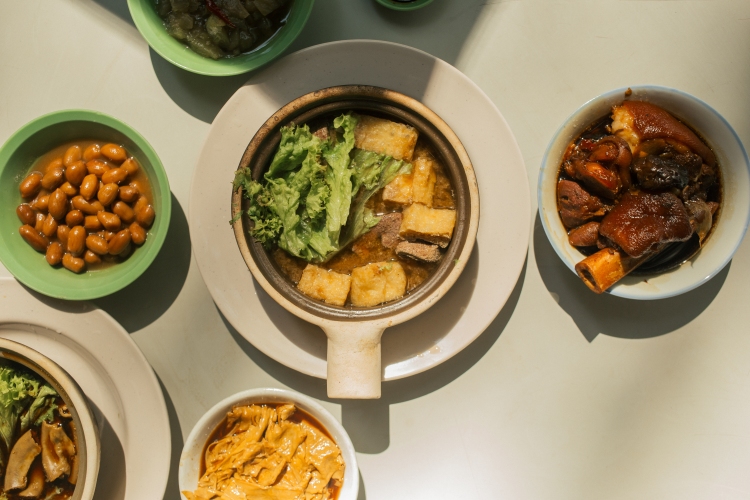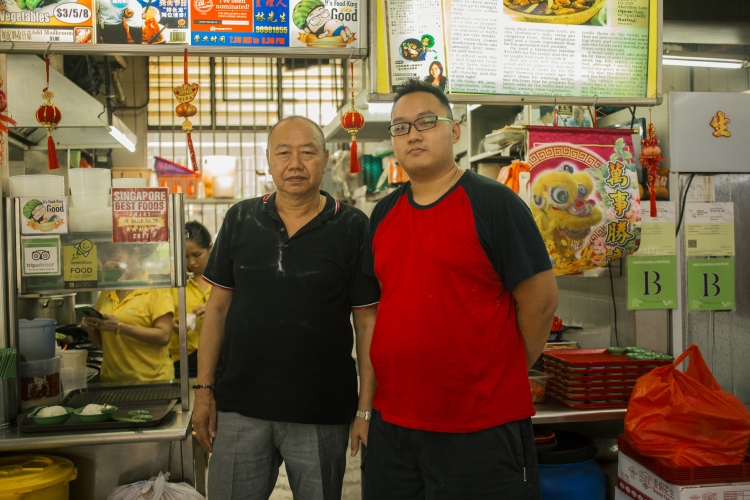
This article was first published in The New York Times Style Magazine Singapore on 22 February 2019.
Steam rises rapidly from the claypot as Lim Jun Leong removes the lid, sending comfortable whiffs of herbal aroma our way. Seated at the al fresco section of a coffee shop in Marsiling, we wait in anticipation as Jun Leong tells us the founding story of Hong Ji Bak Kut Teh, a store selling herbal pork ribs soup with more than 20 years of history. “Hong Ji first started in 1996, when my dad bought over the bak kut teh recipe from a Malaysian couple for S$10,000,” he says. “He felt that it was a waste to lose this recipe.”
Inheriting the Marsiling outlet from his father, Jun Leong is a second-generation hawker who dared to pick up the ladle and commit to working in the stifling confines of a hawker stall. From observing his father work his magic in the kitchen as early as nine years old to helping out part-time during high school semester breaks, one can say that the 26-year-old is the man for the job, with years of practical experience under his belt.
As Singapore reels in to submit a nomination dossier on hawker culture into UNESCO’s Representative List of the Intangible Cultural Heritage of Humanity, the hawker culture has once again garnered spotlight. Today, difficulty enticing a newer (and younger) generation of hawkers is starting to paint a seemingly bleak future on the local food scene.
“A lot of hawkers are going out of business because of high rentals, low-profit margins and retirement,” the 26-year-old reveals. “The long working hours, tough working environment and heat are what deter Singaporeans to work in this line of business.”
But Jun Leong is not alone in his family business. He is one of four siblings who manage different Hong Ji Bak Kut Teh outlets across the island. Together, they are keeping their father’s culinary passion and the hawker spirit alive, one claypot at a time.

At Hong Ji Bak Kut Teh, the rich herbal broth is what continues to attract customers to return over the years. The eclectic blend of Chinese herbs, comprising dried tangerine peel, liquorice root, and Solomon’s seal, infuses the simmered pork broth with a delicate yet addictive sweetness. The flavour is light despite its biting herbal scents. With ingredients, which range from tau pok (fried beancurds), leafy greens, pork innards and a variety of mushrooms, the Malaysian claypot dish is a hearty concoction that nourishes the soul.
“Over the past twenty years, we did not change much,” Jun Leong says. “Some variations can be found at some of our other outlets. But for the store in Marsiling, we still serve the traditional bak kut teh you would get 20 years ago.”

Jun Leong, who graduated with a diploma in biomedical sciences from Republic Polytechnic, only started managing the Marsiling outlet when he finished conscription. “[Our father] didn’t force us to take over. We choose to take over.” Jun Leong says. “For our sister, Siqi, she took over only after she completed her degree. My father still gives us the freedom to pursue our own dreams first. For my brothers, Jun Keong and Jun Xing, they finished their NS and they decided that they didn’t want to study anymore. So, they decided to step up and take over.”
Perhaps it was this initiative and determination they possess that moved and persuaded his 58-year-old father to let go and hand over the reins. Or as his father puts it, “A relief that someone is willing to build upon the brand and carry on his hard work.” But there is only so much an individual or a family can do to paint an idyllic portrait of a regular flow of customers. In light of overseas disasters and unforeseen pandemics, there have been times — the 2008 Sichuan earthquake which saw prices of herbs skyrocket and the 2009 swine flu outbreak which saw a decline in the consumption of the pork rib soup — when the family struggled. “We try to keep things affordable. The last time we raised the prices was in 2014. That was five years ago,” Jun Leong explains.

To Jun Leong, Hong Ji Bak Kut Teh at Marsiling is not just any ordinary hawker stall. It is the place where he first ignites his passion for the Malaysian dish, a place where he is in constant veneration of his father. This is a passion that has endured through and triumphed over many struggles. Today, he is married to an Indonesian Muslim wife and is now with two children.
While contentious issues of religion may have been a factor for others, Jun Leong and his family prefers to keep the interpretation of the religion an open conversation — something that hasn’t hindered his life choices, and enables him to pursue his passion for food. “There was mutual understanding and respect prior. Before we got together, we sat down, and we talked. We respect each other’s religion and we don’t quarrel over this. Work stays outside of the house. There is a line there,” he explains.
For now, Jun Leong remains optimistic about the outlook of Hong Ji Bak Kut Teh. The concerns of finding a suitable successor, an inevitable plight that befalls on many older hawkers, has yet become something to worry about. In some ways, Jun Leong reflects some facet of his father’s open-mindedness and gives his children the freedom to explore. “I give my kids the freedom to choose their career, I will not force them,” he muses.

Today, the second-generation hawker derives gratification whenever customers return their empty claypot for second-servings. Customers, he says, will always get what they ask for. “Black bak kut teh is difficult to find in Singapore. So, I like the feeling when they come back and tell you the food was good, the food was shiok.”
He and his siblings remain honest about the reality of being a hawker in the 21st century. “It is a very big step to take. It is a huge commitment. They [new hawkers] must make sure there is enough profit to maintain their expenses. For start-ups, they must understand that for the first few months or first few years, they will not earn money,” Jun Leong says.
“We perspire and smell bad after a long day of work. We don’t get to enjoy late night parties as we have to get up early the next day,” adds Siqi who now runs the outlet in Ang Mo Kio in a separate interview.

“Currently, I see a lot of initiatives encouraging young hawkers to start their own hawker business. [They] are good. But at the end of the day, it all stems down to whether the younger generations want to do it,” Jun Leong continues, smiling.
As we part from Hong Ji Bak Kut Teh, we are reminded of the casual familiarity in residential coffee shops or hawker centres. At first glance, they are communal dining spaces where hungry souls congregate to feast amid tight heat and at times, inaudible banter. On closer inspection, they tell the tales of the everyday commoner, stories that will persist through time and when revisited in later years, fill the heart with a poignant sense of longing.
“To me, [my shop in] Marsiling is like a second home. I spend most of my time here,” Jun Leong adds. “I grew up with my family in this neighbourhood and now intend to grow old together with it.”

All Images by Tung Pham